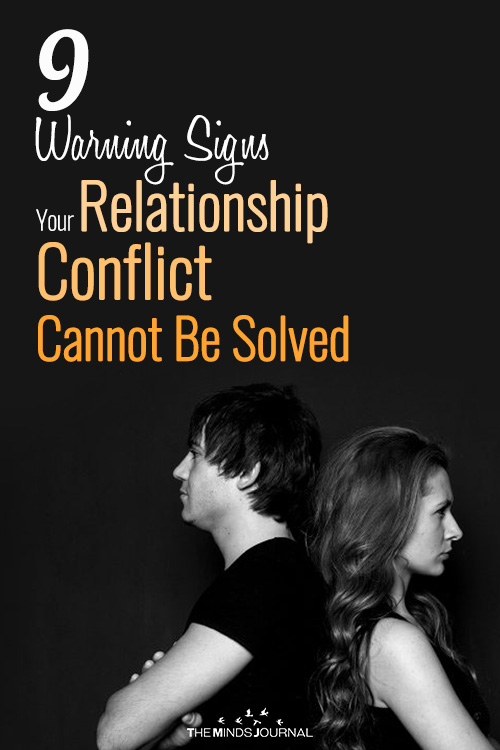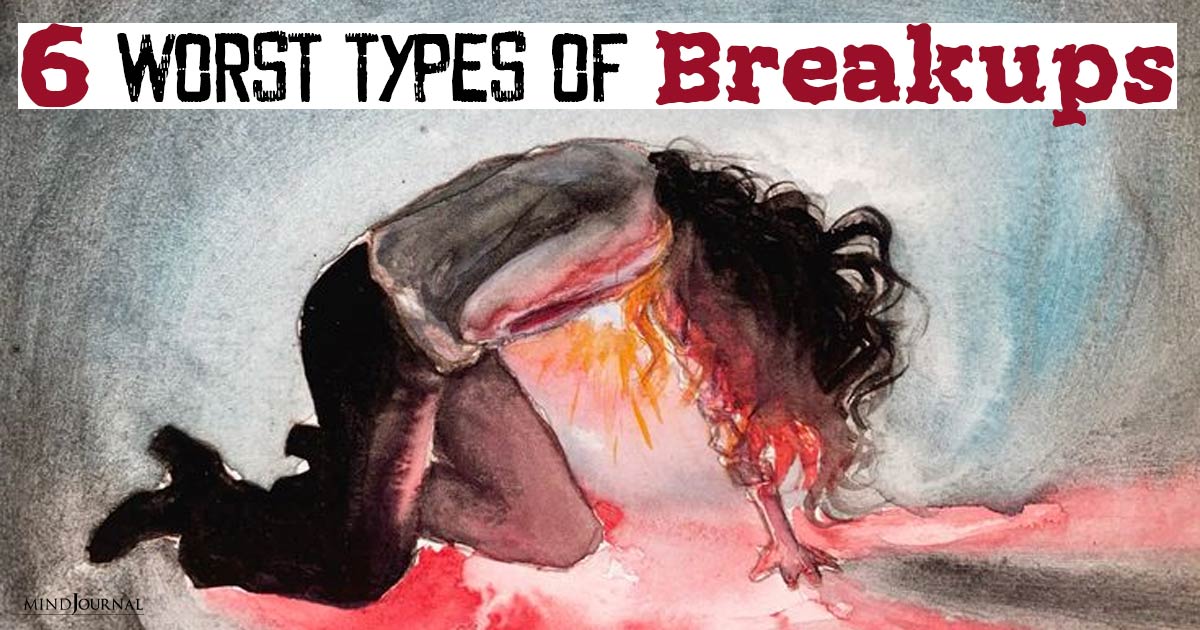Do you have the same argument with your partner over and over again? Are you fighting about the same issues in new and different ways? If you are entangled in a perpetual war with your partner then you need to realize that your relationship conflict is destructive for both of you.
After observing thousands of different relationship conflicts, Dr. Gottman and his colleagues noticed that every relationship has two kinds of problems: solvable and unsolvable.
Solvable problems can be resolved with healthy communication, understanding, and commitment to changes. Essentially, once the problem is discussed in a mature way and an adjustment is made, the problem is no longer a problem.
Unsolvable problems, on the other hand, are those pestering challenges that despite partners’ best efforts to resolve them, they never go away.
Dr. Gottman made this discovery by having couples come into his Love Lab every four years to discuss relationship challenges on camera. The footage from different years was then compared and assessed.
As Dr. Gottman and his colleagues compared each of the most recent recordings to the recording from four years prior, it was as if only four hours had passed. Despite both partners’ hair is a little grayer, their style a little funkier, the issue of concern to them hadn’t changed.
Related: 3 Useful Blueprints For Managing And Resolving Conflict In Relationships
Perpetual Relationship Conflict
It may be surprising to find out that 69% of relationship conflict is unsolvable. 1
Only 31% of problems within a relationship are actually solvable according to Dr. Gottman’s research.
The great news is you can have an excellent relationship even when challenges are still present between you and your partner.
The key to a satisfying relationship for both partners depends on three things:
- What the unsolvable problems are.
- How partners choose to discuss and manage these problems.
- Whether both partners can live with the unsolvable issues
“You don’t have to resolve your major marital conflicts for your marriage to thrive.” – Dr. Gottman
So what are some examples of perpetual relationship conflict? I’ll share some from my relationship:
1. [Punctuality] One partner is habitually running behind and the other wants to be early.
2. [Finances] One partner is more of a spender, while the other is a saver. 2
3. [Socialness] One partner is more extroverted, the other more introverted.
4. [Cleanliness & Organization] One partner is more organized and clean, the other partner is a little messier.
Other typical perpetual issues include:
1. [Time Together] One partner wants more we-time and the other wants more me-time.
2. [Extended Family] One partner wants to spend more time or be closer to extended family, while the other wants more independence from extended family.
3. [Parenting] One partner wants more of an authoritarian parenting style, the other wants more of a permissive parenting style. 3
4. [Relationship Style] One partner wants an ethically non-monogamous relationship, the other partner wants a monogamous relationship.
5. [Creating a Family] One partner wants to have a baby, the other isn’t ready or isn’t sure if they ever will be.
6. [Religion] One partner prefers a more orthodox religious practice while the other wants to practice a more modern form of the religion.
7. [Sex] One partner wants sex more frequently than the other partner.
For a list of the 17 typical problems in romantic relationships, see pages 147–155 in The Seven Principles for Making Marriage Work to evaluate whether an issue of concern is a solvable or unsolvable problem in your relationship.
These perpetual problems stem from fundamental differences in the personalities or lifestyle needs that are core to who each romantic partner is. Inevitably these differences collide and create conflict.
It’s important to note that a problem that is solvable for one couple may be unsolvable for another couple. The key is realizing that when the issue keeps coming up, it may be time to look beyond just the topic and learn how to accept your differences so the problem doesn’t become a barrier to your emotional connection and relationship satisfaction.
The Telltale Signs Your Problem is Harming Your Relationship
Here are the nine destructive signs an unsolvable problem is harming your relationship according to Dr. Gottman: 4
1. You feel rejected by your partner.
2. You keep attempting to talk about the issue but make no headway.
3. You become entrenched in your positions and are unwilling to budge or be flexible.
4. When you discuss the subject, you end up feeling more frustrated and hurt.
5. Your conversations about the problem lack humor, amusement, or affection.
6. You do not accept your partner’s influence, meaning you do not allow their needs or perspective to influence your position on the issue.
7. You vilify each other during these conversations and in your thoughts, even when alone.
8. This vilification makes you all the more rooted in your positions, and you and your partner become polarized, more extreme in your views, and all the less willing to compromise.
9. You are disengaged from each other emotionally.
When these telltale signs are present in your relationship, it’s easy to see how you’re locked in your position. It’s almost like you and your partner are creating a traffic jam in your relationship, each trying to pull off the highway but blocking each other, hence Dr. Gottman calling this stuck feeling “Gridlock.”
Related: Why Conflict in Relationships Isn’t the Root of All Evil
Your Roadmap Out of Gridlocked Conflict
It’s important to know whether you are struggling with a solvable or unsolvable problem. Below is a list of steps to determine if your relationship challenge is solvable or unsolvable, as well as ways to manage it if it is unsolvable.
Step 1: Identify the Core Issue
The first job is to become crystal clear on what the issue actually is.
Too often when couples have conflicts, they fight about multiple topics at once and, as a result, none get resolved or become easier to manage. Or they think they are fighting about the same topic, but because they haven’t clearly understood their partner’s perspective, they fight about two different topics in nasty ways.
Examples:
1. Almost every evening, Ryan criticizes Danny’s TV watching. If you were a fly on the wall, you might think the issue is the TV, but Ryan’s fixation on the TV is actually a surface-level expression of something deeper. Ryan’s hidden wish underneath his criticism is a longing for more time connecting with Danny. The actual issue is how their time is spent together. (Solvable)
2. Jake and Tom have difficulty balancing Tom’s need for me-time and Jake’s need for we-time due to differences in personal preferences concerning autonomy and togetherness. The actual issue is them not honoring each other’s unique differences. (Unsolvable)
3. Kris and Kurt struggle with finances. Kris tends to spend more freely than Kurt and they frequently fight about how much Kris spends and how little they save. The issue is actually that neither partner understands why spending or saving is so meaningful to the other. As a result, they have failed to create a financial strategy that is good for both partners. (Unsolvable)
4. Janice desires to feel emotionally close and intimate with more than one person and wants to form ethically non-monogamous relationships while Steve strictly wants a monogamous relationship. The actual issue is a difference in relationship type preferences. (Unsolvable)
5. Krista wants to have a baby but Stacy doesn’t feel ready and is unsure if she wants to be a parent. The actual issue is the difference between each partner’s desire to start a family. (Unsolvable)
Step 2: Explore How You Discuss These Issues and Manage Differences
As psychologist Dan Wile says, every relationship is two problems: the actual problem and how partners address the problem.
Both emotionally connected and happy couples struggle with challenges similar to those of emotionally disengaged and unhappy couples.
Often the difference in satisfaction in a relationship is not related to the actual issue, but rather how partners discuss the issue (or don’t) and how they work together to make things better for both partners.
When you and your significant other attack what makes each partner unique in the relationship, then you know you’re struggling with an unsolvable problem in a destructive way.
In fact, Dr. John Gottman and Dr. Robert Levenson were able to predict divorce with an 88% accuracy if they noticed a couple had more destructive moments in conflict than constructive 5. In comparison, couples who had a stable relationship years later had five positive and constructive moments for every negative and their negatives were less harsh.
Let’s see how Ryan and Danny (from example one above) talk to each other:
Ryan [walks into the living room and sees Danny watching TV]: “All you care about is the stupid TV and your sports teams.”
Danny: “I deserve time to relax after work. All you ever do is nag me. Get off my back.”
Even in just a single exchange, Ryan and Danny have personally attacked each other’s character which results in escalating their conflicts and distancing them from each other emotionally.
This couple desperately needs research-proven relationship conflict skills to soften how they talk to each other. Let’s see what happens when they apply those skills:
Ryan [walks into the living room and sees Danny watching TV]: “Baby, you just got home and I really want to spend time with you. I’m annoyed the TV is on and I get that you need your time to cool off today. I want to go for a walk with you and need to talk about my stressful day. Can you do that?”
Danny: “I’m sorry you’ve had a stressful day. That’s difficult. I’m up for walking and hearing about your day. And I need some time to veg so I can have enough energy to be engaged in our conversation. You know I’m more irritable and jump to conclusions when I haven’t had time to veg after work. How about I veg for 15 minutes and then I’ll meet you by the door.”
Ryan: “I do want you to have your time to veg and it does help you be engaged. And I’m pretty stressed. Are five minutes of vegging good enough before our walk and then you can do a little more after dinner?”
Danny: “I can make that work. I’ll set a timer so I can meet you by the door in five minutes. Sound good?”
Ryan: “Yeah.”
The differences between this and the previous conversation are striking.
In the first conversation, the partners were critical to each other.
In the second one, Ryan uses the X, Y, Z formula: I feel X about Y behavior and need Z (a positive and actionable request). Ryan also acknowledges Danny’s needs and takes them into consideration when getting his own needs met. This helps make Ryan more influential in the relationship.
Danny responds by being empathetic and validating Ryan’s need. Danny then shares what he needs so that he can give Ryan what Ryan needs.
As they focus on the end goal, they bargain with each other to find a win-win solution.
While Ryan is annoyed that Danny won’t turn off the TV and go on a walk right now, Danny is also annoyed that his veg time is being cut short. Knowing that they both need to be flexible and work together to find a win-win, they accept each other’s influence and find a way to honor both their needs.
Related: 5 Relationship Quotes to Help You Resolve Conflict In Relationships
As you can see, this problem is rather easy to manage when partners apply the following mature conflict skills:
Speaker Skills:
1) Focusing on behavior, not the character of the person;
2) Expressing feelings;
3) Sharing a recipe for the partner to be successful
4) Honoring the other partner’s needs in considering how to get one’s own needs met.
Listener Skills:
1) Reflecting back what was expressed to make sure it’s understood,
2) Validating your partner’s experience and empathizing, and,
3) Listening for the longing or need.
Mutual Skills:
1) Accepting influence by putting both partners’ needs on par with each other,
2) Honoring that there are two different experiences and both are valid,
3) Seeking to find a solution that is good for both partners, not just one.
The Key to Managing Differences Starts With Honoring Differences
“The goal of marriage is not to think alike, but to think together.” – R. Dodd
In Jake and Tom’s scenario (example 2), Jake was initially dismissive of Tom’s needs for togetherness and Tom was dismissive of Jake’s need for independence. They both fought for what they wanted and didn’t acknowledge or honor that they are two different people who have different needs.
“When choosing a long-term partner…you will inevitably be choosing a particular set of unsolvable problems that you’ll be grappling with for the next ten, twenty, or fifty years.” – Psychologist Dan Wile, After the Honeymoon.
When you commit to someone, you are committing to a relationship not only with their good parts but also their annoying parts. As Stan Tatkin, PsyD. likes to remind us, all people—that includes you and me—are annoying and difficult.
Like an annoying dairy intolerance, we have to learn to live with this knowledge about ourselves and our relationship.
Every couple—and this is true for my own partnership as well—has their set of unsolvable problems that they have to learn to manage if the relationship is going to be satisfactory and work well for both partners.
If you don’t learn how to manage it well, you’ll become gridlocked and the satisfaction of your relationship will below. This is because the nasty way your differences are handled spill into even the positive aspects of your relationship, such as your emotional connection, playfulness, and sex.
Most of the reasons relationships fail is because partners do not want to accept their lover wholeheartedly. Rather they accept their partner on the condition that they’ll change over time. That’s a recipe for failure.
“If we did an autopsy on all failed relationships, the number of couples where at least one of the partners was ambivalent—either not all in or waiting for their partner to change—would be very high…If you don’t or can’t accept your partner as they are right now, without cherry-picking the parts you like, you’re in trouble already. Nobody signs up for marriage because they want to be changed by their partner. It doesn’t work. Ever. Go all in or go home. Marriage and commitment can only work if we accept each other wholeheartedly.” – Stan Tatkin, We Do
By helping Jake and Tom truly listen to each other and honor their differences, they were able to learn how to manage this issue by proactively discussing it in their weekly relationship meeting.
“Differences attract us at first, and yet we can find ourselves in relationship trouble when we try to change these differences later. Learning to understand and accept the ways in which you’re different is key to creating lasting connection and enduring love.” – Drs. John & Julie Gottman, Eight Dates: Essential Conversations for a Lifetime of Love
Get to The Heart of the Matter: Exploring Dreams and Hidden Issues
Finally, when it comes to discussing difficult topics that are meaningful for both partners, it’s important to slow down and do a deeper exploration.
Imagine your partner and you stick your fingers in a Chinese finger trap. The harder you pull for each of your positions, the tighter the trap becomes.
Lucky for you, and for me, Drs. John and Julie Gottman noticed that the Masters of relationship did something interesting when they felt at odds with each other.
They slowed down and got curious. They asked each other what was so meaningful about their respective positions.
When couples struggle with the nine telltale signs above, it’s often because neither partner truly understands what is so meaningful or important about their partner’s position.
The goal then is to ask each other about the dreams behind the issue. Sometimes it’s a story from childhood. Other times it’s an unlived goal.
In example 3 above, Kris and Kurt are at odds with each other when it comes to finances.
After exploring the dreams within each of their positions to a point where both partners could say, “I totally understand why that dream is so important,” both partners were willing to find a win-win solution. You can read more about their story here: 4 Steps to Overcome Gridlock That Harms Relationships
Some helpful questions to ask: 6
- Are there any core beliefs that you hold around your position on this topic?
- Is there a meaningful story behind this? Maybe something from your childhood or other past experiences?
- Why is this issue so important to you?
- What is your ideal dream here?
Note: Research on the Gottman Method indicates that about 20 percent of couples struggle with these questions by themselves because some people have given up on their dreams; others blame their partner and don’t take responsibility for not pursuing their own dreams.7 If this occurs for you, then find a Gottman Therapist who can support you in having this transformational conversation.
“Turning toward these perpetual issues with a strong change agenda, with a competitive stance, and from within a win-lose frame is the basis for the most destructive forms of relationship conflict.
On the other hand, turning toward these unavoidable flaws in the intimate relationship from a perspective of compassionate understanding, with an acceptance agenda, with a collaborative stance, and from within a we-are-both-in-this-together frame is the fundamental basis for a solid, long-term, healthy intimate relationship.” – James Cordova
Related: 9 Conflict Patterns That Damage Relationships
Step 3: Decide If You Can Live With The Issue
The final step is determining whether your relationship problem is something you can live with. This is different for each person.
When it comes to committing to your relationship, researchers discovered that happier and more committed couples clearly decide their relationship path rather than slide into their relationship 8.
“Too many [couples] slide through major transitions or life experiences rather than deciding who they are and where they intend to go.” – Fighting for Your Marriage
Far too often, couples make life-altering decisions with positive intent but without fully thinking them through. For example, Grant married Julie even though she made a few statements before marriage that she didn’t want kids. He assumed after marriage her mind would change. It didn’t.
In example 3, Janice loves her partner Steve very much and she always found herself wanting to be emotionally close and intimate with multiple people her whole life. As polyamory became more acceptable in the Seattle culture early in their relationship, Janice opened the conversation with Steve. Because Janice was ethical, she had not cheated or taken any steps to fulfill her longings for connections from multiple people prior to this.
During a “dreams within” conversation, she described how she experiences different parts of herself with different people and how she cherishes the novelty and variety of emotional connection.
Steve was not okay with this and it appeared to be a dealbreaker. His dream was to have a monogamous relationship. Janice and Steve’s relationship preferences were at odds with each other. They were kind and loving with each other and this fundamental difference caused them to decide whether to stay together or not.
After lots of thinking and taking space to reflect, Steve decided that he could live with Janice being non-monogamous if she could live with him being monogamous. Some people might say this is unfair, but it was something that Steve and Janice decided was going to work for them. After all, it is their relationship, so they get to decide what that looks like.
Even five years later, Steve and Janice still have an ethically monogamish relationship as they like to call it. They are both satisfied and have an ongoing conversation to make sure the relationship works for both of them 9.
When it comes to the core issues of love relationships, you need to talk about these things and decide if they are deal-breakers before you fully commit to your relationship.
Sometimes Unsolvable Problems Are Deal Breakers
“A deal breaker is any matter that would disqualify a partner from a committed relationship despite other wonderful conditions.” – Stan Tatkin, We Do
In example 5, Krista plans on having a baby at some point in her life but her partner Stacy isn’t ready and is unsure if she ever wants to become a parent. There is nothing wrong with not wanting to have kids or wanting to have kids, but this fundamental difference can lead to a lot of tension and challenges.
After discussing their dreams around this conversation, Kirsta and Stacy came to the harsh reality that they wanted different families. They cared for and loved each other a lot, but ultimately Krista decides that it was more important that she has kids, a lifelong dream of hers than to stick with the uncertainty that she might not have kids with Stacy.
This became a deal-breaker in the relationship, and Krista and Stacy maturely decided to separate.
Couples all over the world wrestle with problems that can be deal-breakers for the long-term of the relationship. This could be issues of trust, commitment, fidelity, family values, etc.
The number one thing I recommend to people who are dating is to decide to have deep conversations early on in the relationship. If this is you, I’d recommend buying Eight Dates: Essential Conversations for a Lifetime of Love and go on every single date.
As you get to know your partner, work on accepting those differences and be honest with each other when you struggle. Sometimes being honest with each other and deciding to end things can save a lot of drama and emotional pain from sliding into a relationship with unrealistic hopes that things will change. Sometimes things do change, but most often they don’t.
Love requires hard choices and when you face those choices honestly and don’t abandon yourself, it’s easier to find or create a relationship that is deeply fulfilling and meaningful in the long-term.
With love,
Kyle Benson
References:
1. Gottman, J. M., & Levenson, R.W. (1999). How stable is marital interaction over time? Family Process, 38,159–165. doi:10.1111/j.1545-5300.1999.00159.x ↩ 2. This is a classic and oversimplified difference. How we spend and save money is different in each category of our lives. I talk about this more here. ↩ 3. In the book The Couple Checkup, the authors talk about the five different parenting styles. 4. This comes from Dr. John Gottman’s book The 7 Principles for Making Marriage Work. 5. Gottman, J. M. (1994). Why marriages succeed or fail. New York: Simon and Schuster 6. These questions are revised from The Dreams Within Intervention via The Gottman Method 7. This research was mentioned in the Level Two Training for The Gottman Method. 8. Stanley, S. M., Rhoades, G. K., & Markman, H. J. (2006). Sliding vs. Deciding: Inertia and the premarital cohabitation effect. Family Relations, 55, 499-509. ↩ 9. I’m assuming that some people will have emotional reactions as this does not align with their relationship philosophy or blueprint. That is fine. And I hope you can allow others to determine what works for them, rather than judge them for choosing something different. Interestingly, research on attachment theory (how we relate to people in the world) indicates that individuals who are more secure are more accepting of people and communities who have different views and beliefs. This is also why secure romantic partners are more accepting of differences and tend to have less nasty conflict in relationships or use indirect communication tactics. Source: Mikulincer, M., & Shaver, P. R. (2001). Attachment theory and intergroup bias: Evidence that priming the secure base schema attenuates negative reactions to out-group. Journal of Personality and Social Psychology, 81(1), 97–115. ↩
Written by Kyle Benson Originally appeared in Kyle Benson










Leave a Reply